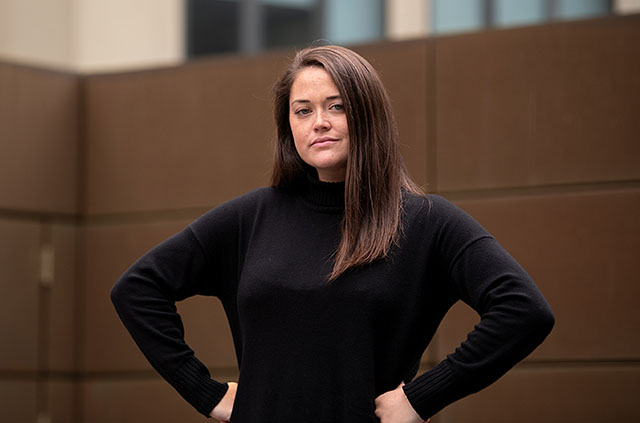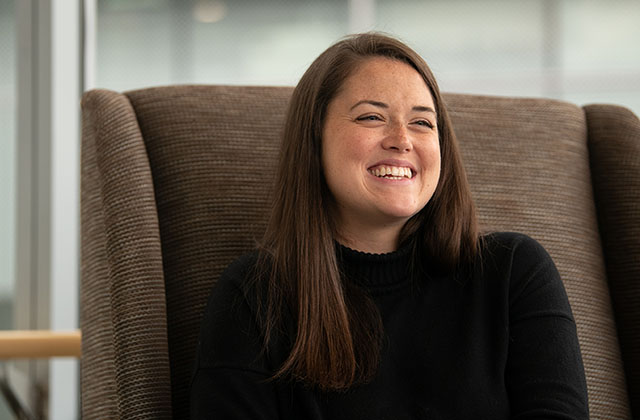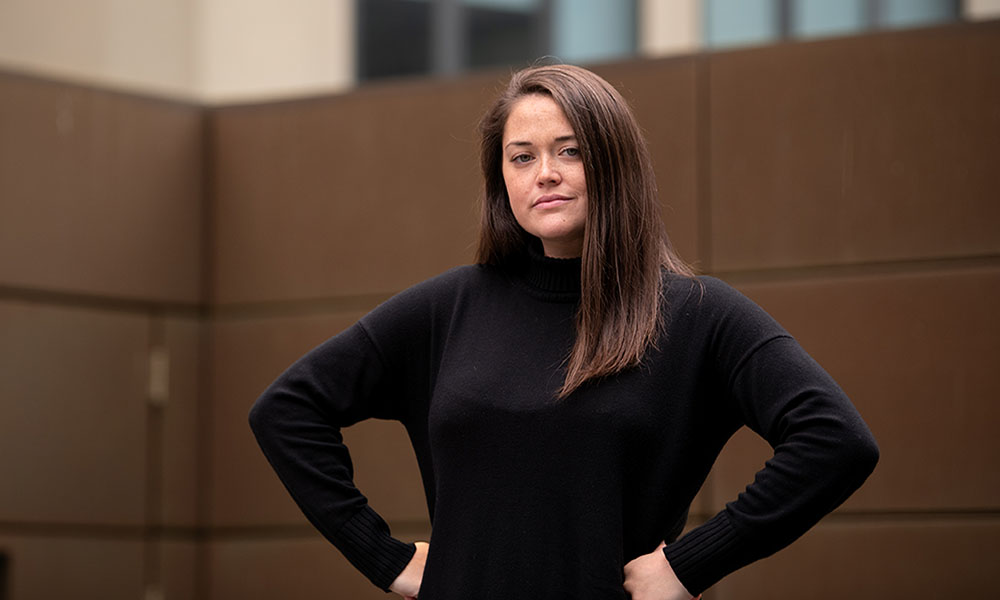Patient Story: Proton Therapy for Brain Tumor with Lindsay Strauss
Pregnant with her first child, Lindsay Strauss was diagnosed with a brain tumor and treated with proton therapy at Mass General Brigham Cancer Institute.
Weather AlertMass General Brigham's hospital campuses and off-site facilities are fully open and operational on Tuesday, Feb. 24, with the exception of some limited closures. For real-time updates and service changes, please check our Alerts page.View Alerts page
Patient StoryFeb | 9 | 2023

Ten days after college graduation, Erin Morrissey began her career as a clinical researcher at Massachusetts General Hospital, a dream job for someone aspiring to go to medical school. A former NCAA Division III lacrosse player and active 21-year-old, Erin threw herself into half-marathon training after graduation. Staying active and eating well had been part of her routine for years as an athlete, so when Erin started noticing changes in her energy levels and athletic abilities, she knew something wasn’t right.
Pain in the lower right side of her abdomen coupled with fatigue and other symptoms brought Erin to Mass General, this time as a patient rather than an employee. Together, Erin and her care team worked to find a diagnosis. After a few appointments Erin was sent in for imaging, a practice she was familiar with working as a clinical research coordinator at the MGH/HST Martinos Center for Biomedical Imaging. With so many life changes occurring in such a short period of time— graduating college, moving to Boston, starting a new job, staying active, and balancing a social life—experiencing fatigue was not out of the ordinary. But what kept worrying Erin and ultimately encouraged her to advocate for further testing was the pain in her side. In the fall of 2019 Erin was diagnosed with a rare form of adrenal cancer called adrenocortical carcinoma. Philip Saylor, MD, Allison Kimball, MD and Sophia Kamran, MD led her expert medical team at Mass General Brigham Cancer Institute and with an acute interest in the medical system herself, Erin was an active, informed participant in her care plan.
“For as long as I can remember I have been very interested in medicine. I was able to approach everything scientifically, taking myself out of the situation and replacing that with an interest in my case from the other side. That turned out to be very important once we realized how rare my cancer was. It was essential to have me involved. From the beginning I was reading all the research I could get my hands on.”
Maintaining a sense of normalcy at work was important to Erin. Before the pathology came back from the surgery that Erin underwent to remove the tumor found on her adrenal gland, Erin believed she’d be back in the office and back to ‘normal’ shortly. When the pathology came back malignant, Erin’s tumor went from a few weeks' recovery to a “rest of her life kind of thing.” Her coworkers were supportive of her cancer diagnosis and navigating being an employee and patient at the same time.
"I had a dual identity. Am I a cancer patient, or am I crushing it at work? I learned that in many settings I can do both."Because of her experiences as a patient, Erin was exposed to many areas of the medical field she may have otherwise not been exposed to, like reproductive endocrinology.
“I was really interested in endocrinology and reproductive and women’s rights, but it wasn’t until I froze my eggs in preparation for cancer treatment that I knew what reproductive endocrinology was. It’s been cool to see all the different areas of medicine I could possibly be interested in.”
“During my radiation treatment I was gifted a workout set from my radiation team, which was sponsored by Caring for a Cure. They knew that I loved working out and being active and was struggling to do so during treatment. It was my favorite day of radiation, probably even better than ringing the bell [on the last day of radiation].”

In 2021, after 11 photon radiation and 22 proton therapy treatments ended, Erin was still on long-term chemo but ready to get outside and get moving again. Inspired by the generous gift of her team, Erin signed up for the Boston Marathon, ultimately raising over $15,000 for Caring for a Cure. “It was fun to do because I was giving back to the cause that I cared so much about.”
As Erin’s peers were navigating post-grad life, moving to cities and starting new jobs, Erin was navigating all that while juggling a diagnosis and treatment of adrenocortical carcinoma. “I had to grow up in certain ways. I was in that in-between of not feeling quite mature enough to figure it all out on my own, but I wasn't a little kid. Trying to navigate that knowing that my peers are also moving to new cities and starting new jobs, and there are COVID lockdowns, everyone is going through different challenges and I had to acknowledge that I was dealing with other things. I had to approach that accordingly, whether that meant being intentional about my plans and not trying to be in every social scene. I was determining what would serve me versus take away from the limited energy that I was able to give. Now I am on the other side and I'm very glad that I protected my space and reached out to people when I did. Just because someone hasn’t gone through this experience doesn’t mean that they aren’t able to support you in other ways.”
As far as advice for others who are going through a similar experience, Erin wants to advocate for listening to your body, and seeking support when you need it. “Listen to your gut and your instincts and seek advocacy assistance. There are so many resources through this hospital, social workers, therapists, that act as great intermediaries between yourself and your experiences with your providers. Utilize any kind of resource you can.”
“I am currently interested in pursuing a professional medical degree, I'd love to become a doctor. I'm not entirely sure what specialty, but my experience as a patient and as a provider in research has certainly guided the kind of doctor I want to be and how I will approach patients in the future. I’ve learned through this experience that doctors don’t always know how it’s all going to turn out, regardless of how many years they spend in school, but they are going to do their best. [Being a doctor] requires both emotional intelligence and hard science. Now that I have some real-world experience, I'm really excited to keep learning the science behind it [in Med School].”
Erin is running the Boston Marathon again this April, raising money for the Pediatric Cancer Clinic at Mass General Brigham for Children.
Using her social media platform to advocate and share her journey has given Erin an outlet that connects her with other young cancer patients, creating a community online that reaches far and wide. You can keep up with Erin on Instagram.
Erin MorrisseyI had a dual identity. Am I a cancer patient, or am I crushing it at work? I learned that in many settings I can do both.
View inspiring cancer survivor stories from Mass General Brigham Cancer Institute’s community of patients, families, and staff.
Pregnant with her first child, Lindsay Strauss was diagnosed with a brain tumor and treated with proton therapy at Mass General Brigham Cancer Institute.
As a patient in our Center for Young Adult Colorectal Cancer, Lauren has formed a close relationship with her surgeon, Motaz Qadan, MD, PhD, and together they have navigated the impact this disease has had on Lauren.
An integral part of one of the world’s most distinguished academic medical centers, the Cancer Institute is among the leading cancer care providers in the United States.
